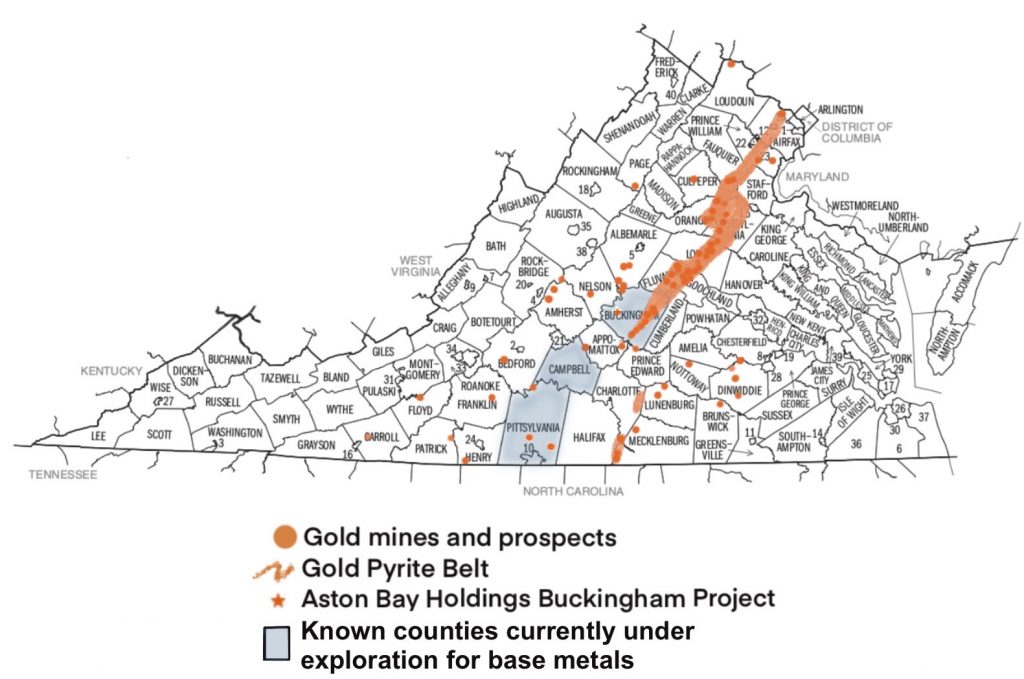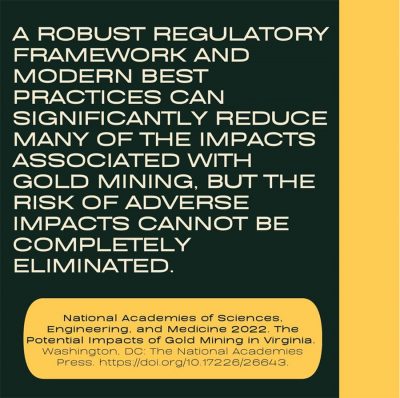
Mining for gold, copper, zinc and lead took place in the 19th and early 20th century in Virginia, along the Gold-Pyrite Belt, which extends from Fairfax to Halifax counties. There are hundreds of abandoned mines in the state, but currently, there are no large-scale metals mining operations in Virginia.
In 2019, mineral exploration company Aston Bay began performing exploratory drilling for gold in Buckingham County. This led Buckingham residents to sound an alarm about this potential new industry and its possible threats to water, air, the environment and local populations.
Those advocacy efforts led to passage of a bill that required a study of potential impacts from large-scale gold mining. The law resulted in two studies, one by the National Academies of Sciences, Engineering and Medicine (made up of issue experts) and another conducted by a State Agency Committee (made up of members from state agencies, community representatives and advocacy groups). Both studies concluded that Virginia has insufficient regulations for large-scale gold mining and — even with regulations — would experience lasting, harmful environmental impacts.
Read more about this issue:
Why would large-scale gold mining negatively affect Virginia?
- Virginia has hundreds of abandoned small-scale mines from the early 20th century that left a legacy of mercury pollution along the Gold-Pyrite Belt, which stretches from Northern Virginia to the North Carolina border.
- Industrial metals mining, including gold mining, is notorious for polluting water resources.
- Regulations have not been updated since the early 1900s, even though the mining process today occurs on a much larger scale.
- Gold mining companies today use cyanide in their metal processing, leaving local communities vulnerable to potential contamination should anything fail during the mining or storage process.
- Of chief concern is the potential health and environmental hazards posed by waste material processing and waste tailing ponds that are susceptible to leaching and spills. Local communities and those downstream could be affected should tailings dams or mining waste depositories fail.
- Virginia’s lack of a comprehensive regulatory framework and insufficient bonding requirements would leave Virginia footing the bill for potential cleanup.
- Likely sites for new large-scale gold mines would be close to the James River and its watershed, which provides drinking water for 2.7 million people, brings millions of dollars into Virginia’s economy from commercial fishing, and attracts over six million visitors annually.
- Operations could require large amounts of groundwater, which could impact the availability of water for private drinking wells.
- Existing strains on access to clean drinking water for many Virginia communities would be exacerbated by a new, harmful industry.
- Prospecting companies are allowed to put water in for exploratory drilling without any county oversight.
What about other metals, like copper, zinc and lead?
Virginia’s current mineral mining regulations are focused on non-metal permits — such as sand, gravel and stone aggregates — and are not designed to address modern-day large-scale and precious metal mining.
The same company that began exploring for gold in Buckingham County in 2019 has also secured property in Pittsylvania and Campbell Counties, where they are searching for copper, zinc and lead.
In 2022, Delegate Shelly Simonds and Delegate James Edmunds introduced legislation to study the impacts of copper, zinc and lead, but the bill failed in sub-committee. In 2023, Delegate Shelly Simonds and Delegate James Edmunds introduced legislation to prohibit the use of cyanide in mineral mining operations, but after passing committee, the bill failed to pass the House.
Want to learn more? Contact jessica@appvoices.org and join the mailing list of Press Pause



